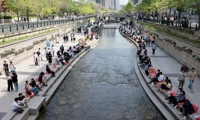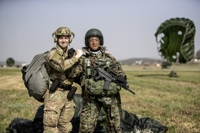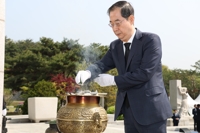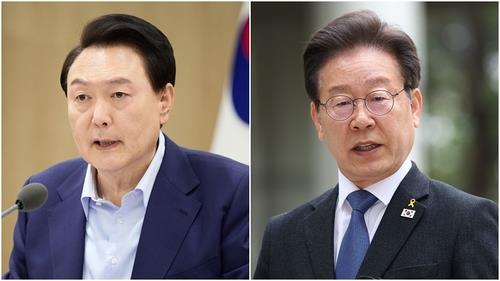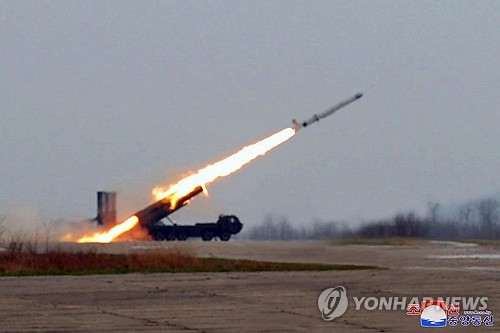(LEAD) Tokyo vows to get Seoul's consent for troop dispatch to Korean Peninsula
(ATTN: CORRECTS typo in headline; ADDS photo)
By Oh Seok-min
SINGAPORE, May 30 (Yonhap) -- Japan vowed Saturday not to send troops to the Korean Peninsula in case of a contingency without a request or prior consent from South Korea, Seoul's defense ministry said.
Such a pledge was made during the talks between South Korea's Defense Minister Han Min-koo and his Japanese counterpart, Gen Nakatani, in Singapore on the sidelines of the Asia Security Summit, also known as the Shangri-La Dialogue.
It is the first time for the neighbors' top defense chiefs to meet bilaterally since 2011 amid soured relations over history issues.
During the meeting, the Japanese defense chief confirmed that Tokyo would never send troops to the Korean Peninsula even for a contingency without prior consent from the Seoul government, according to South Korean officials.
"It is Japan's policy that our self-defense force launches military actions in other countries' territory only after getting a consent from the countries concerned at any circumstances in accordance with the international law, and South Korean cannot be an exception," a South Korean defense ministry official quoted Nakatani as telling Han.
In accordance with the revised Washington-Tokyo defense guidelines announced last month, Japan will be able to play a bigger military role by helping the U.S. and other allies if they come under attack.
Such an exercise of collective self-defense is seen as a precursor to its possible amendment of its war-renouncing Constitution and has sparked concerns that Japan might misuse or abuse the military power on and near South Korean territory. Currently, exercising the collective self-defense right is banned under the Article 9 of the pacifist constitution, while the Shinzo Abe administration re-interpreted it in pursuit of "a normal country" with a expanded military role.
Since Washington and Tokyo have put forth the new guidelines, Seoul has called on them to better reflect its stance in drawing up operational plans based upon the guidelines.
"We've agreed to establish a mechanism to discuss the process needed for Japanese troops' possible deployment to the Korean Peninsula in case of emergency," a senior Seoul ministry official said, requesting anonymity.
Rather than setting up a separate entity, however, the three countries "reached a consensus" to deal with the matter at their regular deputy ministerial-level meeting of the Defense Trilateral Talks (DTT), he added.
Though the pact itself stipulates that joint military operations of the U.S. and Japan will be "in accordance with international law, including full respect for sovereignty," critics have pointed out that the expression is "too vague," while being skeptical whether Japan will be able to or is willing to seek Seoul's invitation during war or in a chaotic situation.
graceoh@yna.co.kr
(END)
-
 Overdue debut of Korean abstract art pioneer Yoo Young-kuk at Venice Biennale
Overdue debut of Korean abstract art pioneer Yoo Young-kuk at Venice Biennale -
 Defense chief says N. Korea's hypersonic missile 'unsuccessful' in last-stage glide flight
Defense chief says N. Korea's hypersonic missile 'unsuccessful' in last-stage glide flight -
 Relax, immerse yourself in scents at Venice Biennale's Korean Pavilion
Relax, immerse yourself in scents at Venice Biennale's Korean Pavilion -
 N. Korea has capability to genetically engineer biological military products: U.S. report
N. Korea has capability to genetically engineer biological military products: U.S. report -
 S. Korea marks 30th anniv. of Korean Pavilion at Venice Biennale with contemporary art
S. Korea marks 30th anniv. of Korean Pavilion at Venice Biennale with contemporary art
-
 Overdue debut of Korean abstract art pioneer Yoo Young-kuk at Venice Biennale
Overdue debut of Korean abstract art pioneer Yoo Young-kuk at Venice Biennale -
 Relax, immerse yourself in scents at Venice Biennale's Korean Pavilion
Relax, immerse yourself in scents at Venice Biennale's Korean Pavilion -
 Artist Lee Bae captures ethereal Korean aesthetics at Venice Biennale
Artist Lee Bae captures ethereal Korean aesthetics at Venice Biennale -
 S. Korea marks 30th anniv. of Korean Pavilion at Venice Biennale with contemporary art
S. Korea marks 30th anniv. of Korean Pavilion at Venice Biennale with contemporary art -
 Defense chief says N. Korea's hypersonic missile 'unsuccessful' in last-stage glide flight
Defense chief says N. Korea's hypersonic missile 'unsuccessful' in last-stage glide flight
-
 Gov't likely to accept university chiefs' request to lower med school enrollment quota
Gov't likely to accept university chiefs' request to lower med school enrollment quota -
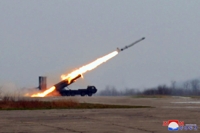 N. Korea says it conducted 'super-large warhead' test for strategic cruise missile
N. Korea says it conducted 'super-large warhead' test for strategic cruise missile -
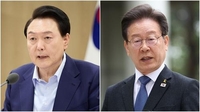 (LEAD) Yoon proposes first-ever meeting with opposition leader
(LEAD) Yoon proposes first-ever meeting with opposition leader -
(URGENT) N. Korea conducted 'super-large warhead' test for strategic cruise missile: KCNA
-
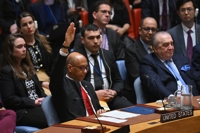 S. Korea supports resolution backing U.N. membership of Palestine
S. Korea supports resolution backing U.N. membership of Palestine














